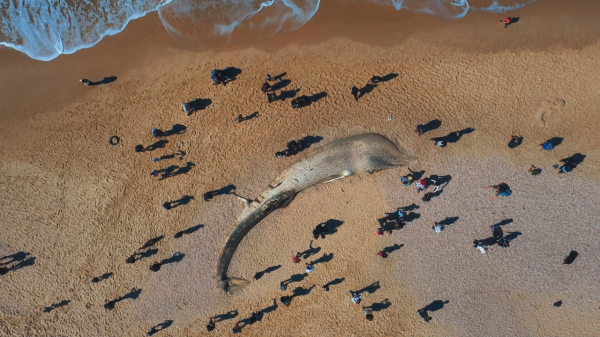
Save this storySave this storySave this storySave this story
In “Requiem for a Whale,” the decomposing animal becomes a backdrop for selfies, no matter how callous or distasteful the photos may appear to some.
The opening shots of “Requiem for a Whale,” an evocative, new short film by the director Ido Weisman, are momentarily destabilizing: are we seeing a nature documentary, or a murder mystery? As the winter sun dips below the Mediterranean Sea, a soft rain falls on a beach—and then the camera lands on the victim: a seventeen-metre whale. In the fading dusk, an investigator arrives with a flashlight to examine the scene. The cause of death may be pollution; the perpetrator, to some degree, is us.
Shot in two days in February, 2021, “Requiem for a Whale” conveys the tragedy of the young creature’s death, while also following the response of human observers. Like virtually every other unusual sight in the era of smartphones, the decomposing animal becomes a backdrop for selfies, no matter how callous or distasteful the photos may appear to some. Officials from Israel’s Nature & Parks Authority arrive to perform an autopsy; journalists report at the scene. From high above, a breathtaking drone shot captures the whale, the waves, and the human scrum.
The New Yorker Documentary
View the latest or submit your own film.

Encountering the death of such a large creature prompts reflection—and the film’s structure matches that impulse, combining visual material from the days after the whale washed ashore with voice-over conversations conducted later on. Weisman was a student filmmaker when he shot the footage; by the time he returned home to Tel Aviv, a large excavator vehicle—the kind you’d be more likely to see at a construction site—had already buried the whale in the sand. Weisman realized that he had the images, but not the sense of context or meaning, to make a documentary. In the months that followed, he contacted a number of the witnesses he had encountered on the beach, asking about their reactions in interviews that sometimes yielded emotional disclosures. “I felt as if he was crying,” one witness says, referring to the whale. “I remember standing in front of him and asking him for forgiveness.”
“Requiem for a Whale” has been nominated for Best Short Documentary at next month’s Ophirs, Israel’s Academy Awards, after winning prizes at several film festivals. The project served as Weisman’s thesis at Tel Aviv University, and took on a deep personal resonance for reasons that the director didn’t initially recognize. That connection is movingly revealed late in the film, which also records, without comment, the eerie coupling of the whale’s demise and the COVID-19 pandemic. Many of the beachgoers wear masks; Weisman recalled that his own face covering partly shielded him from the odor of the rotting carcass, which he described, not unkindly, as “one of the most disgusting smells” he had ever experienced.
According to the Bible, a more famous incident involving a whale took place not far from the scene in the documentary. In the Book of Jonah, the Israelite prophet spends three days in the belly of a whale as divine punishment, before being spit back on the shore. The purported site of that landing, known in Hebrew as Jonah’s Hill, stands a modest distance from where Weisman shot his film, a fact he discovered while doing research. “I thought about this not in a religious way but in an environmental way,” he said, when asked about the connection. The incident in his film, he reflected, taught its own lesson. “The whale is a message about our behavior as human beings,” he said. “That we need to be better, and more kind to this place.”
Sourse: newyorker.com






